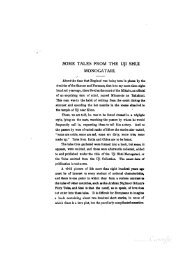Chau Ju-Kua - University of Oregon Libraries
Chau Ju-Kua - University of Oregon Libraries
Chau Ju-Kua - University of Oregon Libraries
Create successful ePaper yourself
Turn your PDF publications into a flip-book with our unique Google optimized e-Paper software.
ISTKODUCTION. I<br />
to the rest <strong>of</strong> the world. Commerce by sea with south-eastern Asia and the -^<br />
countries lying to the west was steadily increasing through the continued<br />
energy and enterprise <strong>of</strong> the Arabs and Indians ^.<br />
The troublous times through which China passed in the fourth, fifth and<br />
B sixth centuries may have had much to do with retarding the development <strong>of</strong><br />
commercial enterprise on the part <strong>of</strong> the people <strong>of</strong> the southern provinces,<br />
but piracy was probably more effective in keeping them <strong>of</strong>f the sea. In the<br />
middle <strong>of</strong> the fifth century, Chinese living along the southern coast were so<br />
harried by the Tongking pirates, who plundered cities and towns, that the<br />
10 Emperor "W6n-ti <strong>of</strong> the Sung had to send, in 447, a punitive expedition into<br />
Indo-China, which laid the country waste and sacked the capital ^.<br />
How hazy were the notions <strong>of</strong> the Chinese <strong>of</strong>the fifth century <strong>of</strong> India and<br />
the "West, how slight the intercourse established with them, may be seen in<br />
the Sung-shu, the history <strong>of</strong> the period extending from A. D. 420 to 478,<br />
15 and written about A. D. 500. In chapter 97 we read: «As regards the Roman<br />
Orient (Ta-ts'in) and India, far out on the Western Ocean (jj^ Jij |g 7^),<br />
though the envoys <strong>of</strong> the two Han dynasties have experienced the special<br />
difficulties <strong>of</strong> this route, yet trade has been carried on, and goods have been<br />
sent out to the foreign tribes, the force <strong>of</strong> the wind driving them far across<br />
20 the waves <strong>of</strong> the sea. There are l<strong>of</strong>ty (ranges <strong>of</strong>) hills quite different (from<br />
those we know) and a great variety <strong>of</strong> populous tribes having different names<br />
and bearing uncommon designations, they being <strong>of</strong> a class quite different<br />
(from our own). All the precious things <strong>of</strong> land and water come from<br />
there all this has caused navigation and trade to be extended to those<br />
25 parts» (-j^ M M ^ M ^ ^ MV' ^^^^^ *^^^ ^® ^°^®^ *^^* ^* *^^*<br />
time what trade there was between China, India, and the West was not in<br />
Chinese hands, and that the Chinese had but a vague notion <strong>of</strong> the lands<br />
whence the products <strong>of</strong> foreign countries were brought to them, and to which,<br />
none <strong>of</strong> their people had ever gone. Additional evidence <strong>of</strong> this is furnished<br />
30 by other dynastic histories covering the period from the end <strong>of</strong> the fourth<br />
to the beginning <strong>of</strong> the seventh centuries, in which we find all the products<br />
<strong>of</strong> Indo-China, Ceylon, India, Arabia, and the east coast <strong>of</strong> Africa classed as<br />
1) In A. D. 414 the pilgrim Fa-hien embarked in Java on a large merchant ship bound<br />
for Canton. The people on board were «Po-lo-mon», a name used in those days by the Chinese to<br />
35 designate the west coast <strong>of</strong> India from Kulam to the mouth <strong>of</strong> the Indus. Legge, A Record <strong>of</strong><br />
Buddhist Kingdoms, 111—115. See also infra, p. 12.<br />
2) M" Gowan, History <strong>of</strong> China, 209, 210.<br />
3) Hirth, Op. cit., 46, 180.<br />
X

















